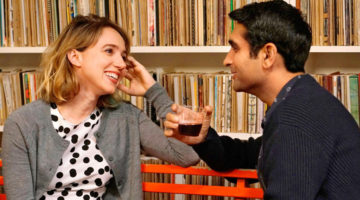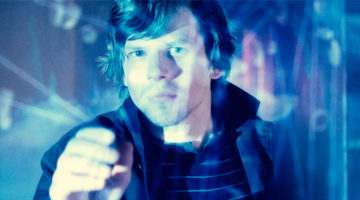Interview: E.L. Katz
I spoke with E.L. Katz on directing his first feature length film Cheap Thrills, what horrifies him in real life and how being a jack of all trades is the best training you can give yourself if you want to go into directing.
How does it feel to make your debuted as a feature film director?
I think where I’m sitting now it feels good. When I was doing it, it was really hard there was definitely a learning curve. I’ve been writing mostly. When you’re able to create by yourself at your own speed it’s pretty nice. Any sort of complaint you have about the writing process, just imagine trying to write if you have somebody looking over your shoulder, going like we gotta go dude hurry the hell up. Right at this point I’m super happy I did it and it’s always good to be done but it was really hard making it. It was definitely harder than what I’d done prior.
If you had to pick one challenge or problem that you had to creatively solve what would that be?
I think time is your worst enemy. We made the movie in around 14 days. There’s just really no room for error at all. You know if you make a mistake it’s in the movie forever. You don’t have time to try too many different things and there really aren’t too many ways that you can protect yourself. The only things I kind of tried to do before we started shooting was try to pick a filming style that maybe would give the performers more room, wouldn’t take as much time to set up –You know we’re doing it all hand held we pretty much only had two shots on the sticks the entire film everything else was handheld. Everything else was lit pretty naturally too so we wouldn’t have to stop. So you just have to kind of give yourself room. The least amount of time to fuck up the camera and the lights as possible just so people can do what’s important and you know save lines.
So I think that was pretty much the toughest thing. Just the fact that you have to go, go, go, go, go and shoot up to 12 pages in a day. Your adrenaline is going it’s just, it just feels very dangerous. It feels like the movie could go off the tracks at any point, you know.
Was there any one experience that pushed you in the direction of filmmaking?
I went to a film school that was also a music school. I was going there initially to possibly produce music or do live sounds. I didn’t really have a lot, I didn’t really know what I was doing. I had never really gone to a real college, I was a high school drop-out. So you know some of these things were sort of being formed, I like music so maybe this is what I’m supposed to do and you know when I was in the school I just ended up making friends with the film kids a little bit more and I think I also figured out that my hearing is kind of shit so I was just like well OK maybe the music/sound stuff isn’t the smartest thing for me to do. I’m having a good time with these film kids and it’s really fun.
I grew up really really, really, loving film I was just a huge fan of it. Anything from the Coen Brothers to Sam Raimi and you know I watched so many horror films, I was such a horror geek. Suddenly it all clicked together. But for a while I didn’t think that there was even a direction that was practical in any way that led to being a filmmaker. Even when I started going to film school it was just a general education and I didn’t really know what facet of filmmaking I was going to be in.
I became best friends with Adam Wingard who was my classmate. We just hung out all the time watched a lot of genre movies, watched a lot of foreign films and at some point when we graduated I didn’t really know what I was going to do and he (Wingard) just said hey man why don’t you come over to Alabama and maybe we’ll make a movie. I drove over there from Florida. The next day I woke up, had myself some breakfast and I was like we should make a slasher movie and he (Wingard) was like, what, why a slasher movie. I’m like, we should do this. We went to the bookstore I picked up a copy of Fangoria sat down with him and we flipped through the pages and we’re like OK this is what we need in a slasher movie.
We started co-writing the script but slowly it got to a point where I was having a lot of fun writing it and Adam was just like, why don’t you write the whole thing. We made the movie and after that I was like well maybe I’m a screenwriter and a producer because that’s what I did in Alabama. So that’s what I spent several years on afterwards and directing came out of nowhere. It wasn’t something that I planned for it was something that finally after writing for eight years now maybe I’d like to try this part.
In those early days, getting funding for your films was that ever a concern or were you just diving into the creative process?
Well fortunately our families paid for the first one but they never got there money back it wasn’t very good. I think that we always wondered if anybody else was going to give a shit about supporting our filmmaking. Because you can’t just have your parents make al your movies it’s not very realistic and you’d make everybody bankrupt. Then it really was about how do you get people to actually support you and finance what you do. That was sort of the journey for years, it took a while. I got into screen writing just for that reason because I was like I need to find a way to make films and still get paid.
So I got in to screen writing just because I wanted to do something that seemed more practical. I’m like OK we can’t just be running around making these crazy movies I need to learn how to write on assignment and be a respectable for hire screenwriter.
So ultimately after a while it was like, maybe I do want to get back to making these crazy movies but I still want somebody else to pay for it.
Cheap Thrills is about everyday life degenerating into something horrifying. What aspects of everyday “normal” life do you personally find horrifying?
The prospect of really making bad decisions and becoming a bad person and fucking up your own life is something that you know I’ve always been aware of in life. Our own narrative about our self, who we are is not always concrete, we can change. We can make bad decisions. Really good people can do bad things. I’m totally aware of that in myself, I’m aware of that in people I know. You just have to be conscious of it. So that’s something that I think informs my writing. Also too knowing that people can be cruel. I’ve definitely experienced my fair share of people not necessarily treating other humans in an honourable way.
That stuff is always scarier to me than any monster or ghost; what people are and what they’re capable of.
In Cheap Thrills Colin and Violet are sort of trying to make their own DIY reality show by playing with the two main characters. In what ways do you feel that, on the whole, we are becoming less empathetic as a society? Or would you say that we are not?
I think we’re definitely becoming less empathetic as a society. If all you show people is people being humiliated and that’s on your television all the fucking time and that’s on the websites and that’s on the blogs and that’s how we sort of process the world…we turn people into jokes. It’s how we process everything, everything is reduced to a tiny little blip. People on a reality show we start to actively, I start to actively, resent people. I watch these shows and I don’t give a fuck about the people that are suffering.
So suffering becomes entertainment. You dehumanise people. I’m in Denmark right now and it’s a totally different country than the states and they still have reality shows that treat people like shit. This is just our entertainment, so it’s easy when stuff happens in the real world for us to be just as detached and removed. That’s why you see when bad shit happens to people there’s so much footage of people just standing around with their cell phones out.
I’m not some Luddite who says we shouldn’t have technology but I do feel like there is an effect, our culture is changing.
In what ways did you work as a horror and music journalist influence your work as a screenwriter and director?
If you’re familiar with the tenets of the genre and the elements of it…you’re able to know how to play around with the form, you just know what are some of the scenes that the audience looks for.
You have quite a bit of experiencing producing. Do you feel that all screenwriters that are hoping to transition to becoming directors should make at least one attempt at producing? Does that experience make for a better director?
I think so because you’ll know why the producers are doing certain things that they’re doing and you’ll also know what’s a good job and what’s a bad job. I think there is an element of directing in producing. You’re assembling components. You’re trying to put together the best running machine that you can. Especially on a low budget the director has to kind of produce.
What was your special effects/makeup budget like for Cheap Thrills? Did you have to find creative solutions to problems?
Four grand at most.
Try not to show too much because you don’t really have the money to do everything. You have the money to do something. On Cheap Thrills we had the resources to do something not everything but something. So you have to make sure that you have one thing really work out because people will remember that moment. You don’t want to do as many things as you can in a shitty way. You want to make your moment work. You need to choose your moment and you need to be realistic about it. Make sure that you craft that moment. A memorable moment is cinema. A whole bunch of stuff is just a whole bunch of stuff.



